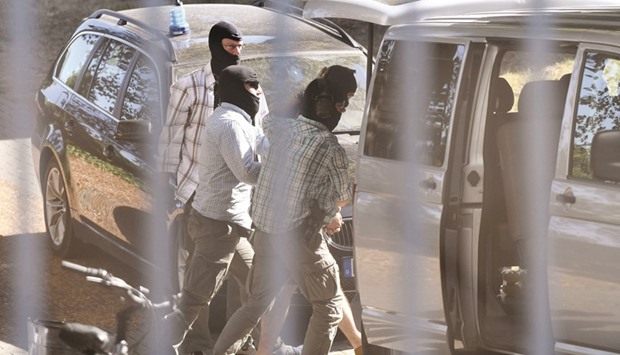German police yesterday arrested three men with forged Syrian passports accused of being Islamic State (IS) militants and labelled a possible “sleeper cell” with links to the Paris attackers.
More than 200 police commandos took part in the pre-dawn raids in northern Germany to detain the men, who were suspected of either plotting an attack or awaiting orders to commit one.
The men were identified only as Mahir al-H, 17, Ibrahim M, 18, and Mohamed A, 26, in a statement issued by federal prosecutors.
They left Syria last October and travelled via Turkey and Greece — a route used by tens of thousands of refugees and migrants — and arrived in Germany in mid-November.
Interior minister Thomas de Maiziere said the three apparently used the same migrant trafficking network as several of the IS gunmen who killed 130 people in Paris in November last year.
“According to what we know so far, the investigation of the (federal criminal office) BKA points to links to the attackers of Paris from November 2015,” de Maiziere told a press conference.
“There is every reason to believe that the same trafficking group used by the Paris attackers also brought the three men who were arrested to Germany,” he said, adding that their forged travel documents came from “the same workshop”.
He said German police had monitored the men for months and tapped their phones, meaning that at no stage was there a risk of an attack.
Prosecutors said in their statement that Mahir al-H had joined IS in its de facto capital of Raqa, Syria by September 2015 and received some weapons and explosives training.
The following month, all three men had pledged to travel to Europe in talks with an IS fighter who was “in charge of missions and attacks” outside of the Syria-Iraq region where the group has its self-proclaimed caliphate.
In Europe, “the three accused were meant to either execute a mission or await further instructions”, the prosecution service said in the statement, adding that no evidence of “concrete orders or instructions” had been found.
The men had received mobile phones and four-figure cash sums in US dollars, as well as the fake passports, from IS, the statement said.
They were detained at three refugee shelters in the northern state of Schleswig-Holstein by more than 200 commandos of the federal police, BKA and police forces of several states.
Police also raided several other asylum seeker shelters, Die Welt daily said.
Warrants for their arrest had been issued by a federal judge on September 7, based in part on intelligence provided by Germany’s domestic security agency, the Federal Office for the Protection of the Constitution.
In July, Germany suffered two bloody attacks claimed by IS, which were carried out by migrants.
German authorities have urged the public not to confuse migrants and “terrorists,” but have acknowledged that more jihadists may have entered the country among the around one million asylum seekers who arrived last year.
De Maiziere also said “it would be wrong to place refugees under general suspicion”.
“Security forces have repeatedly received tip-offs of individual terrorists or sympathisers among the refugees... but most of these have turned out not to be true.”
German foreign minister Frank-Walter Steinmeier said yesterday he saw hope for a lasting ceasefire in eastern Ukraine, while Kiev announced the deaths of three soldiers killed fighting separatist rebels in the past 24 hours.
Steinmeier was speaking on the eve of a visit to Kiev together with his French counterpart Jean-Marc Ayrault, who will hold joint talks with Ukrainian president Petro Poroshenko.
Ukraine and the rebels had agreed a truce to coincide with the start of a new school year on Sept 1 - a ceasefire that was broadly respected until the recent reported rise in attacks.
Steinmeier said the truce, fragile as it was, showed it was possible to improve the situation, and was encouraged after talks with his Ukrainian and Russian counterparts.
“That is why I believe, after my discussions with Pavlo Klimkin in Berlin and Sergei Lavrov yesterday, that it is now possible to agree on a durable ceasefire, without preconditions,” he said on a visit to Riga.
He said Germany and France had made proposals for achieving a new ceasefire and starting the political process required to reach a lasting peace.
Ukraine and the West accuse Moscow of fomenting a pro-Russian rebellion in the east of the country; but Russia denies the accusation.
The Minsk peace agreement, originally agreed between Russia, Ukraine, Germany and France in September, 2014, has helped considerably reduce fighting in the industrial Donbass region.
But violations have occurred regularly and implementing further points of the plan, including holding regional elections and returning control of Ukraine’s border with Russia to Kiev, has long stalled.
The Ukrainian soldiers were the first to die in open fighting this month.
Ukrainian military spokesman Oleksandr Motuzyanyk said over the past day separatists had also used heavy weapons for the first time this month and directly attacked a Ukrainian position in the Luhansk region.
“A sabotage-and-reconnaissance group crossed the river and attacked our servicemen.
The fight lasted for 15 minutes,” Motuzyanyk said in a daily televised briefing.
Rebel leaders denied violating the truce, accusing the Ukrainians of attacking rebel positions.
They said separatist forces would observe a new unilateral ceasefire, starting at midnight on September 15.
“I call on the Ukrainian side to take this seriously and show that they are prepared to do this rather than merely paying lip service,” Donetsk rebel leader Alexander Zakharchenko said in a statement on Russian television channel Rossiya-24.

A man suspected of being an Islamic State (IS) militant arrives at the Federal Supreme Court in Karlsruhe, southern Germany.
